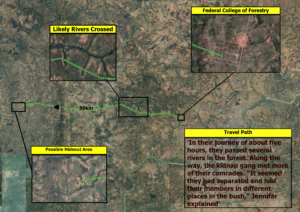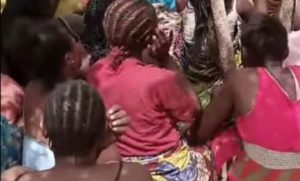#Afaka39 Abduction (2): ‘Bandits Told Us They Could Laugh With Us And Still Kill Us’
It is less than a month since the release of 39 students kidnapped from the Federal College of Forestry Mechanisation, Afaka. Another victim and her family share their experience; HumAngle tells the story.

Jennifer Peter felt sick and needed to lie down. She had just knotted a wrapper at her chest in preparation for a bath when terrorists barged into her hostel at Federal College of Forestry Mechanisation, Afaka in Kaduna, Northwest Nigeria.
It was past 11 p.m. on March 11, 2021, and Jennifer’s bath would be deferred for many, many hours after that. Her first wash in captivity would be in a stream with a handful of detergent. And the four other times she would enjoy that privilege, spaced within the over 50 days she and her 38 other schoolmates spent under the watch of their captors, would be with only water.
Deep into the forest
Jennifer had tried to outrun trauma on the night of her abduction in March, by sneaking into the bathroom to hide. Unfortunately, another girl followed suit and, trailing her, gun-wielding terrorists burst in and forced them out.
Jennifer was supposed to be a final-year Horticulture student but COVID-19 changed everything. They were just about to write their exams when the terrorists paid them a visit.
Her thoughts were jumbled as they were herded through the school’s fence earlier broken by the intruders. “I was scared and prayed in my mind,” Jennifer narrated. Some of the terrorists were dressed in military uniform, some in jeans and other types of casual clothes. Some had their faces covered; others did not.
In their journey of about five hours, they passed several rivers in the forest. Along the way, the kidnap gang met more of their comrades. “It seemed they had separated and had their members in different places in the bush,” Jennifer explained.

Again, at some point, their movement was delayed because the terrorists hoped the state government would pay a ransom. So, when this did not happen, they took their captives deeper into the forest.
Uncertainty back home
It was three weeks after Janet Peter had a car accident that her younger sister, Jennifer, was kidnapped.
Janet was still recuperating when the bad news came. Her sister had come home the previous weekend to see her. She had been visiting every weekend since Janet had the accident.
“She had told me she would come again to check up on me,” Janet said. “It happened on Thursday and she was supposed to come home on Friday. She always took special care of me when she was around.”
Within that week, Janet’s family called her sister’s phone and it was one of the terrorists who picked. “He said, are we not in Kaduna that we didn’t hear what happened? I said, no, and he said that we should wait, we would know. Then he ended the call,” she told HumAngle.
Then another terrorist called. He sounded calm when Janet asked him where they were and he said they were somewhere around Abuja. When she asked to speak with her sister, they said they were now the owners of the phone. “The background was noisy like it was a marketplace,” Janet added.
When the kidnappers called weeks later, they demanded N5 million. But Janet’s mother insisted she only had N150,000.
“He said we should use the money to buy pure water and share it with our village people,” Janet told HumAngle. “Then he ended the call.”
The terrorist called again, almost immediately but this time Jennifer was put on the line. “She asked our mum to go to the school and collect money to add it up to what she had because a meeting was being held there at that very moment,” Janet narrated.
Their mother was shocked that her daughter knew this. Apparently, the terrorists used to give their abductees progress reports of what was going on.
Mrs Peter went to the school and learned from the parents that the kidnappers had allowed their children to communicate with them. The terrorists seized the opportunity to threaten to kill the male students and marry the girls if the ransom was not paid.
“The parents, particularly the mothers, were confused. The school authority was saying nobody should pay a ransom because those who were unable to pay up may lose their children,” Janet said.
Later, because the parents’ committee noticed that the abductors seemed to know their every move, they changed their meeting venue frequently. In addition to this, they only revealed the venue on the meeting day.
How they were treated
At first, the terrorists threatened to kill the students since the government did not respond. The night after that, Jennifer was scared and felt like her whole world was crumbling.
“They said they didn’t want our parents’ money but that of the government,” Jennifer continued. “That was when they took us deeper into the forest. They talked a lot.”
They didn’t rape anyone, Jennifer pointed out in despair. “I don’t know where some mediums get their news from. The first time we were interviewed, none of us said we were raped. Even in the hospital we were taken to, we told them we were not raped. Five days later I started getting calls from people asking if we were raped. Nobody was molested and the media should stop spreading false news,” she urged.
It got to a point when the girls got used to their captors, Jennifer revealed. This was after they had spent about two to three weeks in captivity. “We started to gist with them,” she told HumAngle.
Then the terrorists said something shocking: “They told us that we should forget the fact that they laugh with us. That they can still laugh with us and kill us.”

So, the girls prayed and hoped they would eventually be released.
By this time, Jennifer had been offered a shirt to wear by one of her schoolmates. They were in the open without a proper camp for shelter.
Hope
Like Emmanuel Benson who also spoke to HumAngle, Jennifer never lost hope that she was going to make it back to her family. Daughter to a widow, she had four siblings waiting back home.
“It was just like a vision. I saw us returning home,” she said. “And as we were taken away, I told my colleagues that I saw us coming back even though I didn’t know how God would do it.”
But then the tension increased when she spoke to her mother over the phone.
The terrorists had the habit of telling the girls they would soon be released until Jennifer learned to disbelieve them. “Because they had been saying it and it didn’t happen,” she said. “But when their boss himself finally told us so, I believed it.”
They trekked for about five hours before they made what appeared to be their final stop. Then the kidnappers made a call demanding that the money should be brought. This was around 11:00 p.m. or 12:00 midnight.
“We rode on a motorcycle for about three hours. Then it seemed our people had told them it was late and asked for a postponement to the following day,” Jennifer continued.
The terrorists got angry, threatened to kill the students and throw their bodies in the river. They added that “they can come and carry us from the river tomorrow,” Jennifer recalled. At that moment, most of the kidnappees burst out crying.
But Jennifer could not shed a tear. “I tried to cry but couldn’t. I still had hope,” she said.
When they were dropped somewhere in the forest, she thought they were close to a road or some kind of civilisation. But there was no such thing. The gang waited till two buses appeared and a fellow terrorist was exchanged for the students.
Then they were driven to the school where a huge crowd waited.
“The experience has taught me to know God more,” Jennifer told HumAngle. “I’m not worthy of his mercy but he had mercy on me and saved my life.”
Support Our Journalism
There are millions of ordinary people affected by conflict in Africa whose stories are missing in the mainstream media. HumAngle is determined to tell those challenging and under-reported stories, hoping that the people impacted by these conflicts will find the safety and security they deserve.
To ensure that we continue to provide public service coverage, we have a small favour to ask you. We want you to be part of our journalistic endeavour by contributing a token to us.
Your donation will further promote a robust, free, and independent media.
Donate HereStay Closer To The Stories That Matter




